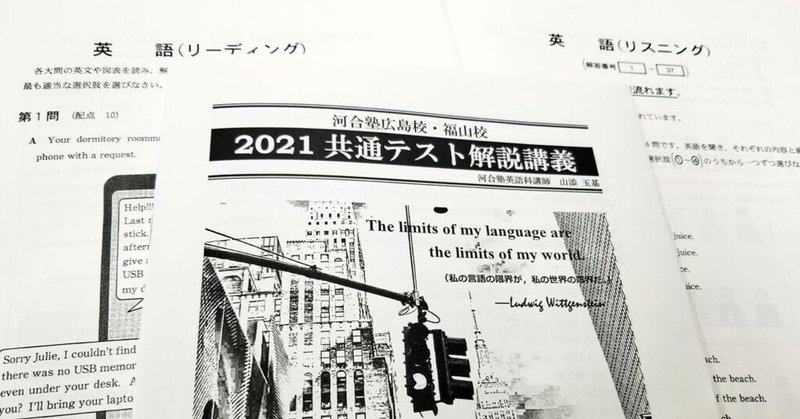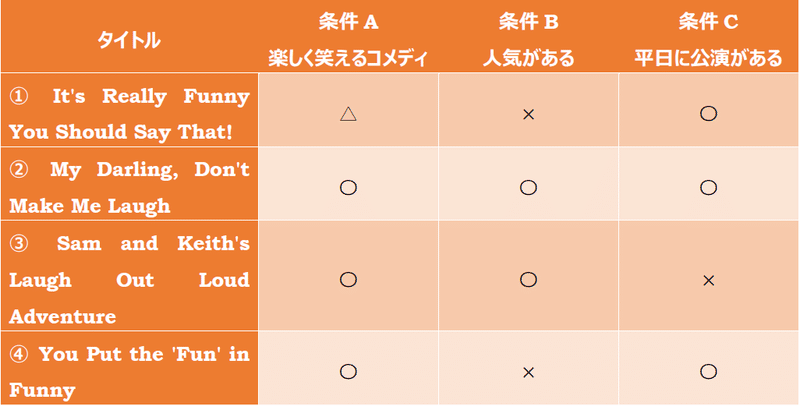
2021年度大学入学共通テスト第1日程解説【英語・リスニング】
▼1月16日に実施された,2021年度大学入学共通テスト【英語・リスニング】の解説です。リーディングについては以下のリンクをご覧ください。
▼また,リスニングの問題・解答・スクリプト・音声などは以下のリンクから入手してください。
【1】リスニング概略
▼以下,私が解いた際に受けた印象です。
① 全体的に,2018年11月に行われた試行調査の問題とほぼ同じ形式,分量,難易度であったが,試行調査の時は第1問~第3問が2回読み,第4問~第6問が1回読み出会ったのに対して,2021年度共通テスト本番では第1問~第2問が1回読み,第3問~第6問が1回読みとなったため,その分,やや難度が高くなったとも言える。
② 聞き取り英文の分量はおよそ1,400語と2020年度センター試験(1150語程度)より大幅に増加した。ただ,試行調査と比べると,第3問意向を1回読みにしたためか,ややゆっくりで問題と問題の間の時間も少し多めに余裕があるような印象も受けた。
③ 問題冊子に書かれている文字情報やグラフ・図表などのビジュアル情報と合わせて考える必要がある。そのため,音声が流れる前にそれらの情報をどれだけ素早く読み取って準備しておくかが重要になる。
④ 特徴的な問題としては以下のようなものが挙げられる。
(a) 発話の「意図」を問う問題(第1問,第2問・問10)
(b) 「言い直し」による情報の追加(第4問・問22~25)
(c) 4人の発話者の意見を把握する(第6問)
→さすがにこれはやや無理があったように思える。
⑤ これは2018年の試行調査の分析をしたときに思ったことだが,センター試験の時代には筆記(リーディング)で問われていたことが,共通テストではリスニングで問われていると言えるのではないか。たとえば,センター試験筆記の第3問のディスカッション問題,第4問のグラフ・図表+英文読解,第5問の会話長文問題(1997年度~)などの設定が,共通テストのリスニング問題の根底に脈々と受け継がれているような印象を受けた。
【2】リスニング大問別解説
第1問
[A問題]発話者の「意図」を問う問題。
問1 [1] ②:“Can I have some more juice? I’m still thirsty.” と言っているので,②の “The speaker is asking for some juice.” が正解。
問2 [2] ④:“Where can we go this weekend? Ah, I know. How about Sunset Beach?” と言っているので,④の "The speaker wants to visit the beach." が正解。
問3 [3] ③:“To start working in Hiroshima next week, Yuji moved from Chiba the day after graduation.” と言っているので,③の “Yuji will begin his job next week.” が正解。
問4 [4] ②:“I won’t give David any more ice cream today. I gave him some after lunch.” と言っているので,②の “David got ice cream from the speaker today.” が正解。
[B問題]文法的に正しく英文の内容を解釈する。
問5 [5] ②:“Almost everyone at the bus stop is wearing a hat.” と言っているので,②のイラストが正解。
問6 [6] ①:“Nancy already has a lot of striped T-shirts and animal T-shirts. Now she’s buying another design.” と言っているので,①のイラストが正解。
問7 [7] ③:“The girl’s mother is painting a picture of herself.” と言っているので,③のイラストが正解。
第2問
▼対話の情報とビジュアル情報を組み合わせる。
問8 [8] ②:“mine has a cup on the top” と “Does it have a big handle on the side?” “No, but it has a strap.” という情報から,②が正解。
問9 [9] ④:“Like the one that can clean the house.” と “Exactly. That’s the best.” という情報から,④が正解。
問10 [10] ①:“Don’t you need garbage bags?” “No, they’ll be provided.” という情報から,ゴミ袋は含まれない。 また,“Right, you could get pretty dirty.” と “And it’s sunny today, so I should take this, too.” という情報から,手袋と帽子が必要だと推測できる。よって①が正解。
問11 [11] ①: “Down there, next to the lockers across from the restrooms.” という情報と,“Is it all the way at the end?” “That’s right, just before the stairs.” という情報から,①が正解。
第3問
▼対話の主旨を理解し,情報を整理する問題
問12 [12] ①:「教師は4月14日に何をしているか」が問われている。 “I’d love to! Oh . . . no, wait. There’s a teachers’ meeting that day, and I can’t miss it. But good luck!” という情報から,① Attend a meeting が正解。
問13 [13] ②:「何が最初に片づけられるか?」が問われている。 “Where do these boxes go?” “Put them on the shelf, in the back, and then put the cans in front of them, because we’ll use the cans first.” という情報から,② Boxes が正解。
問14 [14] ③:「会話について正しいのはどれか」が問われている。 “Just a minute . . . . Um . . . there’s definitely no email from you.” という情報から,③ The woman didn't get an email from the man. が正解。
問15 [15] ④:「女性が兄の計画についてどう思うか」を選ぶ問題。 "The weather should be much warmer by then." という情報から,④ The weather won't be so cold when he comes. が正解。桜については "I hope it’s not too early for the cherry blossoms." "Well, you never know exactly when they will bloom, but the weather will be nice." から,② He should come earlier for the cherry blossoms. や,③ "The cherry trees will be blooming when he comes." は不可。
問16 [16] ①:「なぜ男性は機嫌が悪いか」を選ぶ問題。“Well . . . when I tried to buy one yesterday, they were already sold out. I knew I should’ve tried to get it earlier.” という情報から,① He couldn't get a ticket. が正解。
問17 [17] ②:「女性は何をしたか」を選ぶ問題。1文目で “Look! That’s the famous actor ― the one who played the prime minister in that film last year. Hmm, I can’t remember his name.” と言い,”You mean Kenneth Miller?” と男性が尋ねたところ,女性は “Yes! Isn’t that him over there? “と応答する。しかしその後,男性から “I don’t think so. Kenneth Miller would look a little older.” と否定され,女性は “Oh, you’re right. That’s not him.” と認める。これらの情報から,② “She mistook a man for someone else.” が正解。
第4問
[A問題]複数の情報を比較検討しながら適切な順序に並べる問題。
問18~21 ワークシートのグラフを完成させる問題。数値や分数,序列を表す表現に注意する。
問18 [18] ①: “The most popular selection was “going out with friends,” with 30 percent choosing this category.” から,① Going out with friends が正解。
問19 [19] ②:““Playing online games” received a quarter of all the votes.” から,② Playing online games が[19]に入る。
問20 [20] ③: “The third most selected category was “studying,”” から③ Studying が[20]に入る。
問21 [21] ④:“Exactly half that percentage of students selected “working part-time.” から,④ Working part-time が [21] に入る。
問22~25 表を完成させる問題。年号や数値に注意する。ただし,あとから間違いに気づいたり大事な情報を追加する「うっかり八兵衛」に注意。
問22 [22] ①:“The price of any title released in the year 2000 and before is reduced 30%.” から,[22]に③を入れたくなるが,後半の “Oh, there’s one more thing! The titles with a star are only 10% off, regardless of their release date, because they are popular.” という情報から,① 10% が正解。
問23 [23] ②: “Titles that were released between 2001 and 2010 are 20% off.” という情報から,② 20% が正解。
問24 [24] ①: “The titles with a star are only 10% off, regardless of their release date, because they are popular.” という情報から,① 10% が正解。
問25 [25] ⑤: “Anything released more recently than that isn’t discounted.” という情報から,⑤ No discount が正解。
[B問題]与えられた複数の情報を統合・整理して適切なものを選ぶ問題。
問26 [26] ②:以下のように情報を整理する。なお,正解の選択肢②の文末にある too に注意。"Actually, that’s why they started performing it on weekends, too." (実は,そういうわけで週末にも上演し始めたんだ)ということは,平日にも上演されていることが前提となる。

第5問
▼音声情報をワークシートと図表で整理しながら解く。表現の言い換えにも注意。
問27 [27] ②:“to develop new approaches to economic sustainability” から,② a sustainable economy supporting が正解。
問28 [28] ①:“hygge is not about the material things we see in popular images like candlelit rooms and cozy bedrooms with hand-knit blankets” から,① goods が正解。
問29 [29] ②:“The main point of hygge is to live a life connected with loved ones while making ordinary essential tasks meaningful and joyful” から,② relationships が正解。
問30 [30] ⑤:“hygge is not about the material things we see in popular images like candlelit rooms and cozy bedrooms with hand-knit blankets” から,⑤ indoors が正解。
問31 [31] ④: “Real hygge happens anywhere ― in public or in private, indoors or outdoors, with or without candles” から,④ everywhere が正解。
問32 [32] ④: “These high taxes pay for a good welfare system that provides free healthcare and education” から,④ Danish people's welfare system allows them to live meaningful lives. が正解。
問33 [33] ①:グラフの内容と,最初の講義の終わりの “Nevertheless, Denmark has above-average productivity according to the OECD” という情報,およびグラフを紹介する “but it doesn’t mean they produce less” から,① People in Denmark do less overtime work while maintaining their productivity. が正解。
第6問
[A問題]話者の主張を把握する問題。情報を「まとめて言い換える」力が求められる。
問34 [34] ③:Janeの主張を選ぶ問題。内容から推測することが求められる。以下の〈Script〉の太字箇所より,③ Living with a native speaker shouldn't be a priority. が正解。
問35 [35] ③:Shoが何を決める必要があるかを選ぶ問題。内容から推測することが求められる。以下の〈Script〉の【 】より,③ Whether to stay with a host family or at the dormitory が正解。
〈Script〉
Jane : Are you all right, Sho? What’s wrong?
Sho : Hey, Jane. It turns out a native French-speaking host family was not available . . . for my study abroad program in France.
Jane : So 【you chose a host family instead of the dormitory】, huh?
Sho : Not yet. I was hoping for a native French-speaking family.
Jane : Why?
Sho : Well, I wanted to experience real spoken French.
Jane : Sho, there are many varieties of French.
Sho : I guess. But with a native French-speaking host family, I thought I could experience real language and real French culture.
Jane : What’s “real,” anyway? France is diverse. Staying with a multilingual family could give you a genuine feel of what France actually is.
Sho : Hmm. You’re right. But I still have the option of having a native speaker as a roommate.
Jane : 【In the dormitory?】 That might work. But I heard one student got a roommate who was a native French speaker, and they never talked.
Sho : Oh, no.
Jane : Yes, and another student got a non-native French-speaking roommate who was really friendly.
Sho : Maybe it doesn’t matter if my roommate is a native speaker or not.
Jane : 【The same applies to a host family】.
[B問題]4人の学生の会話からそれぞれの主張を把握する問題。
問36 [36] ①:レシートの電子化に賛成した人数を答える問題。〈Script〉の太字は「紙のレシートが必要=電子化に反対」している。Kateだけが最後まで “No way! There should be NO paper option” と電子化を主張しているので,①が正解。
問37 [37] ②:Lukeの意見を最もよく表すグラフを選ぶ問題。 “more people would rather have them” から②のグラフだとわかる。
〈Script〉
Yasuko : Hey, Kate! You dropped your receipt. Here.
Kate : Thanks, Yasuko. It’s so huge for a bag of chips. What a waste of paper!
Luke : Yeah, but look at all the discount coupons. You can use them next time you’re in the store, Kate.
Kate : Seriously, Luke? Do you actually use those? It’s so wasteful. Also, receipts might contain harmful chemicals, right Michael?
Michael : Yeah, and that could mean they aren’t recyclable.
Kate : See? We should prohibit paper receipts.
Yasuko : I recently heard one city in the US might ban paper receipts by 2022.
Luke : Really, Yasuko? But how would that work? I need paper receipts as proof of purchase.
Michael : Right. I agree. What if I want to return something for a refund?
Yasuko : If this becomes law, Michael, shops will issue digital receipts via email instead of paper ones.
Kate : Great.
Michael : Really? Are you OK with giving your private email address to strangers?
Kate : Well . . . yes.
Luke : Anyway, paper receipts are safer, and more people would rather have them.
Yasuko : I don’t know what to think, Luke. You could request a paper receipt, I guess.
Kate : No way! There should be NO paper option.
Michael : Luke’s right. I still prefer paper receipts.
▼第2日程の解説については,気が向いたら(+時間に余裕があれば)書きます…(;´・ω・)
この記事が気に入ったらサポートをしてみませんか?
